

Teaching Resources For Students And Teachers. Lessons Worth Sharing. COVID-19: Everything you need to know to stay healthy and entertained while stuck at home. For the most up-to-date news and information about the coronavirus pandemic, visit the WHO website.
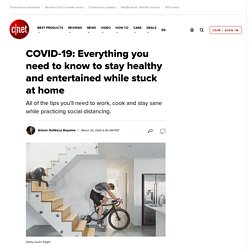
Schools, businesses, restaurants, gyms, museums and other public places across the US closed down this week in attempts to contain the COVID-19 pandemic. Many people are staying home and practicing social distancing to avoid spreading the viral disease further. If you're not used to spending all of your time at home, whether you live alone or with a partner, a family or roommates, you might be feeling a little unsure of how to pass the time -- especially since the government's social distancing directive might last for weeks. Never fear: CNET has put together this guide of everything you need to know about coronavirus and infection prevention, but also tips for working, cooking, learning and staying physically and mentally healthy from home.
Read more: Best services for working, eating and entertaining yourself at home Keep track of the coronavirus pandemic. What Teachers in China Have Learned in the Past Month. Since February 17, I’ve been teaching 11th-grade humanities writing to students who are self-quarantined in China.
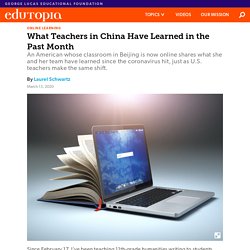
Our teachers were in the same position several weeks ago that U.S. teachers are in now—we were expecting to teach in classrooms in Beijing. Now we’re teaching virtual classes remotely from our homes in China and countries around the world. Teaching Remotely for Grades K - 12. Celebrating Student Success in Online Learning. Picture this moment: a teacher is handing back graded exams to a classroom full of anxious students.
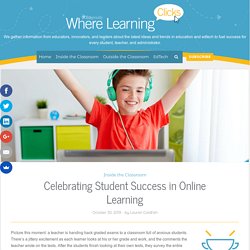
There’s a jittery excitement as each learner looks at his or her grade and work, and the comments the teacher wrote on the tests. After the students finish looking at their own tests, they survey the entire classroom, looking for facial expressions that indicate the positive or hurtful experiences graded assessments so often induce. The “handing back of the test” ceremony often ends with the teacher making some remarks recognizing students that have performed particularly well, or where student improvement is needed. In an online learning environment, recognition of this type is largely absent. On the one hand, you lose opportunities for students to feel bad while observing others surpassing their own successes, but on the other, you also lose opportunities to recognize students for their learning triumphs.
A teacher's 7 tips for remote learning during the coronavirus. Imagine yourself sitting on a beautiful beach in the Philippines, enjoying a relaxing week off from school when your phone buzzes with messages.
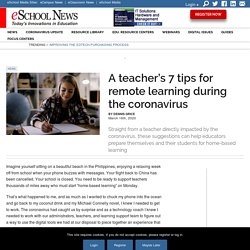
Your flight back to China has been cancelled. Your school is closed. Tips for working from home with kids. UGA education experts offer ideas to keep your children engaged With the closure of schools and child care programs in addition to some employers encouraging workers to telecommute, parents across Georgia and the nation are coping with a new and odd day-to-day reality: working from home while trying to take care of their kids.
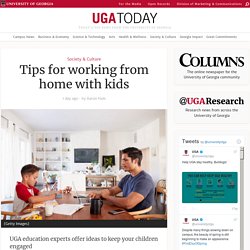
The task is sure to be more challenging for some, depending on the age and temperament of children and the demands of the job. Two University of Georgia family and education experts/faculty have a few recommendations to keep your kids engaged and hopefully provide opportunities to get work done. Be on schedule For starters, maintaining a schedule is a crucial start for success, said Diane Bales, an associate professor focused on child development and families. Self Care for Teachers (online teachers, too!) - Off2Class Blog.
The following post on self care for teachers is an Off2Class guest post by author and teacher Patrice Palmer .
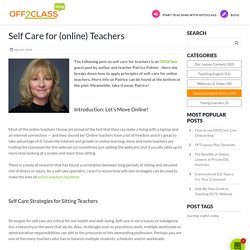
Here she breaks down how to apply principles of self-care for online teachers. More info on Patrice can be found at the bottom of the post. Meanwhile, take it away, Patrice! School Closures? Using PBL in Remote Learning. Editor’s Note: This is the first of three posts PBLWorks will be publishing in response to the growing number of school closures due to the coronavirus crisis.
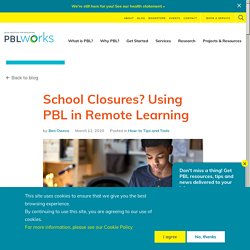
Much of the advice below would also apply to online/remote use of PBL generally. Look for our next two posts on this topic on March 17 and March 19. It’s been said that necessity is the mother of invention. So many educators who have not previously thought about virtual learning in their classrooms or schools are now confronted with that possibility because of the COVID-19 virus crisis. Working remotely can be a difficult enough transition in any case, but doing it in a Project Based Learning environment is particularly challenging, with the level of student collaboration, targeted support, and community interaction inherent to Gold Standard PBL. An Open Letter to Teachers About Online Classes. Nearly three million students currently attend online programs and six million take at least one online class.
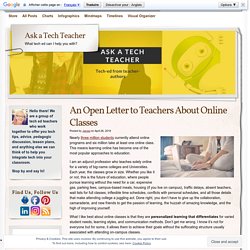
This means learning online has become one of the most popular approaches to education. I am an adjunct profession who teaches solely online for a variety of big-name colleges and Universities. Each year, the classes grow in size. Whether you like it or not, this is the future of education, where people pursue learning without the need for a car, expensive gas, parking fees, campus-based meals, housing (if you live on campus), traffic delays, absent teachers, wait lists for full classes, inflexible time schedules, conflicts with personal schedules, and all those details that make attending college a juggling act.
Three Free Webinars About Transitioning to Teaching Online. In my previous post I mentioned Rushton Hurley's Emergencies and Switching to Online Learning.

Later this week Rushton is going to host three free webinars on the topic. The webinars are Wednesday at 4pm ET and 7pm ET and then again on Friday at 4pm ET. You can register for the webinars here. In describing the webinars Rushton wrote, "This program is not a simple collection of web-based tech tools, but rather one which will focus on how to help prepare your team in this difficult time. " Remote Learning: Tips for Thriving in This Ecosystem. Coronavirus Has Led to a Rush of Online Teaching. Here’s Some Advice for Newly Remote Instructors. Every day, a new batch of colleges announces that in-person classes are closed and teaching will shift online to try to halt the spread of the coronavirus COVID-19.
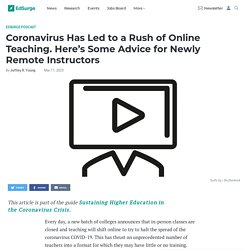
This has thrust an unprecedented number of teachers into a format for which they may have little or no training. So EdSurge asked our teaching advice columnist, Bonni Stachowiak, to offer a quick primer. What to Think About When Your School is Closing Due to Coronavirus. COVID-19 has left many educators and administrators nationwide operating under a rapid response system to make sure learning continuity plans are in place for students. As of March 15, Education Week reports that “at least 64,000 schools are closed, are scheduled to close, or were closed and later reopened, affecting at least 32.5 million students.” While the Center for Disease Control and the World Health Organization offer advice and strategies on how to stay healthy and avoid community spread, below is a list of items for educators to think about in the case of a school closure: Schools and Coronavirus:What You Should KnowFind general guidance on COVID-19 from the Centers for Disease Control and Prevention, the World Health Organization, and other health organizations, in addition to resources for navigating schools closures and online learning.
Check out How K-12 Schools Should Prepare for Coronavirus from the Center for American Progress. Avoid new assignments. Best practices in online teaching strategies membership. The Correct Digital Learning Design Process. Onlineteachguide.pdf. How To Use Bloom's Taxonomy In eLearning. 10 Best Practices To Be An Effective Online Teacher. The digital classroom brings with it a range of unknown and unexplored territory, mostly in part to its relative newness when compared to traditional teaching methods.
To be an effective online teacher, there are 10 simple but effective practices you can follow. When coupled with a comprehensive course load and the right resources, there’s no reason why online learning can’t be even more effective than a traditional classroom setting. 1. Be Present Sure, you might not be physically present in a classroom, but there are many ways to make yourself known in the digital realm. 2.
As the online classroom can often feel a little free-form, you’ll need to provide students with a very clear set of expectations before they commence their studies. 3. 15 Digital Book Report Ideas Your Students Will LOVE. Are you looking to jazz up the traditional book report? Your students would have a blast responding to reading with some of these EASY digital ideas listed below. Walt Disney Imagineering Partners With Khan Academy To Bring You ‘Imagineering in a Box’ Imagineering fans, get ready! If you’ve ever been one of many guests who’s visited a Disney theme park and found yourself inspired to dream, build and create, there’s a new online program you just can’t miss!
Welcome to CK-12 Foundation. Google Applied Digital Skills - Teach & Learn Practical Digital Skills. Sample E-Learning Lessons. Beyond the Worksheet Packet: PBL Projects to Adapt for Remote Learning. Editor’s Note: This is the second of a series of posts PBLWorks is publishing in response to the possibility of school closures due to the coronavirus crisis.
Lesson Plans. Khan Academy schedules for school closures.